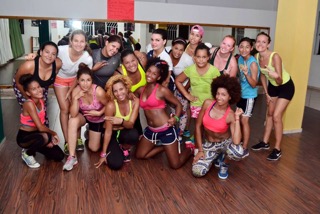
BY OLIVIA BURTON
I’ve never sweated so much in my life.
At the un-air-conditioned N’Forma gym in Cabrera, four volunteers from Camp Esperanza and I joined a group of about ten Dominican women for one hour of Zumba, a fitness program created in Colombia in the 1990s that uses Latin dance moves, squats and lunges set to popular and traditional songs. Yulissa Mena, the local instructor, teaches Zumba from 7-8 p.m. Monday through Friday. The month-long pass may be the best 500 pesos I have ever spent.
With almost zero formal dance training, I was worried that I would not be able to keep up with the class. But Yulissa is an amazing instructor, exaggerating her movements and shouting directions in Spanish, occasionally turning around to remind us to smile and to shout “ZUMBA!” after every song, no matter how exhausted.
During Cabrereños Ausentes in late July, an annual festival in Cabrera in which Cabrerans who have left the small town return for a weekend of parties, Yulissa and her niece, who sometimes helps teach the classes, danced onstage on the first night of the festival. The other volunteers and I cheered her on as she performed dances that were much more difficult than anything we could ever attempt in class, and she waved at us and several other regulars to her classes who were also in the crowd to support her.

For this group of women, Zumba is more than a fun way to sweat off a few hundred calories. As an environment where they are encouraged to love their bodies and to motivate each other, Zumba is empowering.
Catcalling is extremely common in Cabrera; in fact, it’s rare to walk down a street and not hear a man hiss “Pssst!”or shout “Holaaaaaa!” or even yell “You’re beautiful, I love you!” On the wooden dance floor at the gym, the shouts are similar in content, but the context of the Zumba class makes them encouraging rather than aggressive or threatening. When someone walks in late, she is greeted with welcoming shouts rather than the furtive glances I’m used to at gyms back home. “Pa’ abajo!” (get lower!) they shout to each other, and even to Yulissa, during the fast-paced dance to Pitbull’s “Fireball.” “Màs sexy!” Yulissa will sometimes shout we attempt to do body rolls to “Bucket” by Swappi.

One evening, due to a WiFi lapse and a subsequent miscommunication with the other Camp Esperanza volunteers,I arrived at Zumba alone. Some of the women noticed that I was by myself and invited me to stretch with them before the class. I was not looking forward to walking about eight blocks home on the unlit streets at night, but I did not want to inconvenience any of the women from Zumba by asking for a ride home. Cabrera is a very safe town, but it isn’t advisable to walk alone at night, especially as an obviously foreign woman. So I hid my wallet in the waistband of my exercise shorts and began to walk briskly down the dark sidewalks towards my homestay.
Before I had walked even a block away from the gym, a small car pulled in front of me, blocking my path. Instinctively, I backed up and tried to walk around the other side of the car in the street. But just as I was turning around, the car window rolled down and I recognized a woman from class. “Do you need a ride?” she asked me in Spanish. “Sí, por favor,” I answered, breathing a sigh of relief.
“My name is Francina,” she said as I got in the car. We talked about the Zumba class, and I told her about the camp where I volunteer, both of us switching from English to Spanish in order to communicate. “My English is not very good,” she said in Spanish. “And my Spanish isn’t very good either!” I replied in Spanish. Francina told me that she goes to Zumba nearly every evening not just because she wants to exercise, but also because it’s a fun way to end the day.
“You really shouldn’t walk alone, it’s not safe,” she told me as we drove down the dark streets lit only by the moonlight and the light escaping through open doorways and windows. I said that I was incredibly grateful for the ride, and I told her that Zumba classes that I had taken in the United States were not nearly as friendly and supportive. “But they’re still fun, right?” she asked. I told her that Zumba classes at home were fun in the way that exercise can sometimes be fun, but the Zumba class in Cabrera feels more like dancing with friends. She laughed, and we reminded each other of our names one more time before she dropped me off at my homestay.